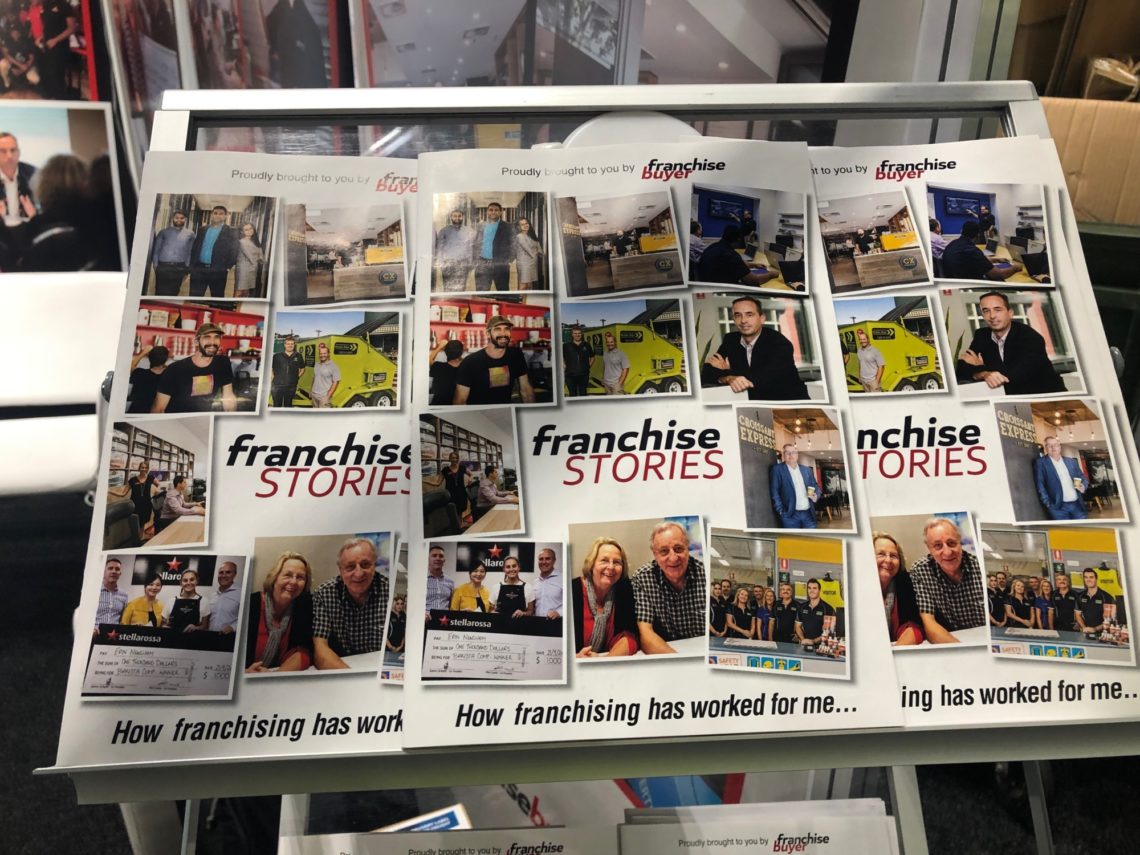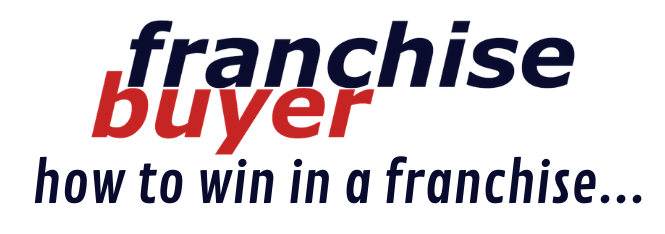May 09, 2019
What are buyers saying about franchises?
Asking buyers why they are thinking about buying a franchise recently gave some valuable insights for all concerned.

I really enjoy the time we spend at the franchising expos run in major metro cities each year. I’d want to, as we have featured at every franchise expo across the country for the last 8 years!
Talking face-to-face with hundreds of people looking to invest in a franchise business is a great opportunity to understand what people are thinking at a deeper level than is available via our online engagement.
Let’s not beat around the bush, franchise expos are sales events. Franchise companies pay substantial $ to take a space, and do their best to demonstrate and pitch their investment opportunity to people eager to window-shop the opportunities.
What are people saying?
Recently at the Sydney expo we did things a little different. We always have many, many discussions with all sorts of people about buying a franchise. This time, we had a set of questions to ask people willing to submit to the interrogation!
We had just under 50 people give us answers to the set questions to help us take the pulse of what is running through the minds of buyers. I’d like to give a bit of a summary and commentary of what we found out from the answers, as well as from the general chats we had with hundreds of buyers across the weekend.
Q 1. What are the first words that spring to mind when you hear the word ‘franchise’?
The vast majority of responses to this basically centred on the view that it is an opportunity to be your own boss. This may come as no surprise, as it is very much the way franchising has positioned itself as a business model over an extended period.

Franchising is well-positioned as the solution to getting into your own business in just about any field you like.
The next most common responses to this question were around cost. ‘How much per month do I have to pay’, ‘what is it going to cost me to get in’ ‘what extra costs are there beyond the initial price’, and so on, were often said.
To be honest, with the amount of recent negativity swirling around the franchising sector, I did expect answers that were confronting and or negative. I got none, and all I got was what were basically some anecdotal joke type one- liners on it. I’m not sure what to make of that, but I put it down to the fact that people are ‘aware but not alarmed’. Speaking with many franchisors at the event, they reported the same, but they also reported to me that broadly their feeling was that they sensed people were significantly better informed and equipped with more research based questions on their business model.
This is an encouraging sign and a very positive thing.

Q 2. What worries you about a franchise?
Practically every answer here centred on return on investment and transparency. Answers like;
- the management fees
- putting money in and not getting a return
- that it’s not legitimate or sustainable
- unexpected surprises around cost
- that it makes money for them and not us
- that it’s not what they make it out to be.
The ROI aspect was no surprise to me of course, given that it is a business investment. However, the broader transparency issue kept popping up and it was clear that buyers are concerned about whether they are being told the correct information.
Good advisers are crucial for franchise buyers to get the right information, AND to feel comfortable in the decisions they are making. Every franchise company in the market worth considering should be engaged in making sure buyers are accessing knowledgeable, professional advisers who know franchising. This is good for business all-round.
We’ve got to get better at helping buyers find the right advisers to get the right information and advice for them. I especially like what FRANdata is doing to help here with their accreditation initiatives for professional advisers in legal and accounting advice specific for franchising.
Q 3. What makes you interested in a franchise?
Responses on this question was quite varied. In fact, of all the questions, this was the one that got the widest range of answers. Some of the responses included;
- security and the fact it is established
- get a lot of support in marketing and operations
- have a team behind me
- I need to earn more than I’m currently earning as an employee
- that it’s well-known and the end-customer knows what to expect which is not the case with an independent business.

The responses here demonstrate that we all approach and do things with quite different rationale, motivations and intentions. With this highlighted awareness, I think it is very important that franchise companies really understand WHY each person approaches them. Generally, we tend to try to pigeon hole people, and I guess in franchising it’s easy to let the answer to question 1 – ‘I want to be my own boss’, to be the thing that we think drives everyone.
Indeed, the answer to this question, albeit brief, gives insight into the varied expectations that each person is coming to a franchise with. It should help partly shape a systems’ approach, but also shape the way people selling franchises focus communication topics that is in line with the individual expectations of particular prospects.
Q 4. Have you any experience in running your own business?
No surprise here for me as 70% of people who responded had no experience of running their own business. Again, this is very much what franchising has positioned itself correctly for. It ties into the aspiration to be your own boss which we got as the dominant answer for our first question.
I can see a shift here though in that I believe people are and will continue in numbers to start to gravitate toward franchises that are in line with their experience. It’s essentially risk aversion, and this again is good for everyone. For example, a teacher gravitating toward a tutoring franchise, a hospitality experienced person to a cafe franchise and so on. I think it just makes sense for all concerned, and I’d like to see more of it.
When this happens, it acts to reduce the risk in the business as the training period and business ramp up can instead be more heavily weighted toward things that the new franchisee does not have experience in and needs the most training and help – sales and marketing. As it drives sales and customer counts, every business lives or dies by sales and marketing, so by being experienced broadly in ‘the thing you do’ in the business already, means more attention can be paid to the things that contribute to make the $ happen.
I often hear franchisors talk about the fact they don’t want people with experience in their niche as they have ‘bad habits’. I’d be re-thinking that approach and more about how it may be better for the franchise operation.

Q 5. Is there any type of franchise you are thinking of and why?
Again, this was pretty broad in the types of response we got. In my time with franchise buyer, the most popular franchises have mostly been in food, cafes, pizza and similar. This is changing, and has been for a couple of years as more diverse possibilities come to market. The answers reflected this shift with things like;
- B2B because I don’t like B2C as I want weekends off with my family
- Flexible as I have responsibilities at home
- probably in food as it is a safer option as people always need food
- gym or beauty as my daughter is doing an injectables course.
Best options
I recall one conversation clearly, and it has made me think a lot since.
A lady approached with her mum and introduced herself, appealing to me for information about what franchise she should be looking to buy. This is a question I’m asked over and over at franchising expos given we are not ‘selling’ franchises at all and basically giving away magazines!
She explained that she needed a ‘flexible’ franchise because she was a carer for her autistic son, and that her partner also could not work due to a medical condition. Mum was going to put in some money to help her get a business, and both were terrified that they would make a bad choice and lose more money like they had in another business previously.
My advice was basically that it doesn’t matter what anybody tells you, that a shop-front business that she had ‘show bags’ of, is simply not going to be flexible enough for her, and that work from home options is really all she should be focusing her research on. These options are out there.
Due Diligence
She talked about confusion and not knowing what to do, or who to trust. She did not know if what she was being told by people was true or not, “How can I tell if it’s true?” she asked. It’s hard to give a detailed answer in that environment, but we talked for some time. For anyone looking to buy a business or franchise, trust your gut, as if it sounds too good to be true, it probably is, and ask endless questions. Only after you are comfortable with the answers you get, then engage advisers to go over it thoroughly, work through scenarios, be honest with yourself and realistic. You engage them to ask the questions you didn’t know to ask!
Don’t approach it looking for reasons not to get into business, but go into it knowing that you have a plan and are prepared for possible scenarios. And remember, you still want to be your own boss!
There you have it. That’s what we found out by just asking a few very quick and simple questions of people looking to invest in a franchise.
Hope it helps...
















